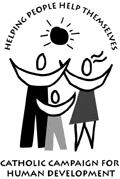Local CCHD Grants
The primary objectives of local grants from the Catholic Campaign for Human Development (CCHD) within the Archdiocese of Milwaukee are to fund projects which:
- Work toward systemic change
- Build economic strength, and/or
- Expand the political voice of the poor.
Grant pre-applications for 2023-2024 are due January 18, 2023
Pre-application Form
CCHD Funding Policies
- Local CCHD grants are not guaranteed to be renewed.
- CCHD may fund projects which are often separate and distinct activities being carried out under the sponsorship of an organization. In some cases, an organization may request funding from CCHD for its general operating expenses. In these cases, the organization then becomes a project for CCHD purposes.
- For an organization to be eligible for new project funding, it must demonstrate that the new project endeavors to address activities which are distinctly different than those funded previously by CCHD.
- CCHD allocates funds only to organizations which are incorporated and where the organization has an Internal Revenue Service 501(c)(3) tax exempt designation.
- The Archdiocese of Milwaukee will consider applications for grants ranging from $5,000 up to $15,000. Amounts awarded may differ from amounts requested. Grants awarded must benefit residents within the ten counties of the Archdiocese of Milwaukee.
Criteria for CCHD Local Funding
Three new funding policies are in effect beginning with applications received January 2019.
- Any organization ineligible for a national grant due to time limits is also ineligible for a local grant.
- No organization may receive a local grant in the same grant cycle year they receive a national grant.
- Any organization that has received a local grant for 3 consecutive years is ineligible to apply for a local CCHD grant for a 2 year period. After the two year period the organization who received funding for 3 consecutive years may again be eligible to apply for a local grant.
To be eligible for CCHD funds, a project must satisfy all of the following criteria simultaneously. However, due to limited financial resources, eligibility does not guarantee funding.
1. The project must benefit a poverty group. At least 50% of those benefiting from the project must be from the low-income community. The project must also demonstrate the ability and have a plan to develop leaders from that low-income community. Your organization needs to state how you define poverty for your community. This can be both descriptive and/or statistical. You may use Federal, State, local or other indicators to define poverty.
2. Members of the poverty groups must have the dominant voice in the project. For local grants, at least 30% of those who plan, implement and make policy (e.g. the Board of Directors) of a project, should be persons who are involuntarily poor. For national grants, 50% of those who plan, implement and make policy (e.g. the Board of Directors) of a project, should be persons who are involuntarily poor. For projects which do not presently meet this criterion, applicants must document the following:
- Why members of the poverty group do not have the dominant role in planning, implementing and policy making at the time of application.
- How members of the poverty group were involved in determining their need for the project.
- What time schedule is planned for the poverty group to assume leadership and control of this project.
3. Projects must work to bring about institutional change by addressing the basic social, economic and/or political causes of poverty. CCHD defines institutional change as:
- Modification of existing laws and/or policies;
- Establishment of alternative structures and/or redistribution of decision-making powers;
- To a lesser extent: Provision of services which result in the achievement of institutional change noted above or leads the recipient community to focus on them.
4. CCHD grants cannot be used to fund other organizations.
5. The project activity for which funding is requested must conform to the moral and social teachings of the Catholic Church.
6. Projects should directly benefit a relatively large number of people rather than a few individuals.
7. Projects should generate cooperation and solidarity among and within diverse groups in the interest of a more integrated and mutually understanding society.
8. Projects should document that as a result of CCHD funding, there are possibilities of generating funds from other sources or of moving towards becoming self-supporting within the timelines established in the proposal.
Projects That Meet CCHD Criteria
CCHD primarily funds community organizing projects where groups of people participate in solving problems that affect their lives. A common theme in community organizing is building a powerful organization to influence decision-making processes so that people working together can bring about change in policies, institutions and/or laws. Another theme is the development of local leadership through these community organizations.
Projects That Do Not Meet CCHD Criteria
The following classifications do not meet CCHD funding criteria:
- Direct service projects (e.g. day care centers, recreation projects, community centers, scholarships, subsidies, counseling programs, referral services, cultural enrichment programs, direct clinical services, emergency shelters and food programs, refugee resettlement programs, etc.).
- Projects controlled by government (federal, state, local), educational, or ecclesiastical bodies.
- Research projects, surveys, planning and feasibility studies, etc.
- Projects sponsored by organizations which at present receive substantial sums from other funding agencies (private or public), unless the applicant documents that this project cannot be funded by these agencies.
- Individually owned, for-profit businesses, unless applying for an economic development grant.
- Projects that violate fundamental Catholic teaching.
- Projects engaged in partisan political activity, or projects sponsored by organizations whose major focus is in partisan political activity.
Contact Information
If you have any further questions, please contact CCHD Diocesan Director, Susan L. McNeil at 414-758-2214, mcneils@archmil.org.